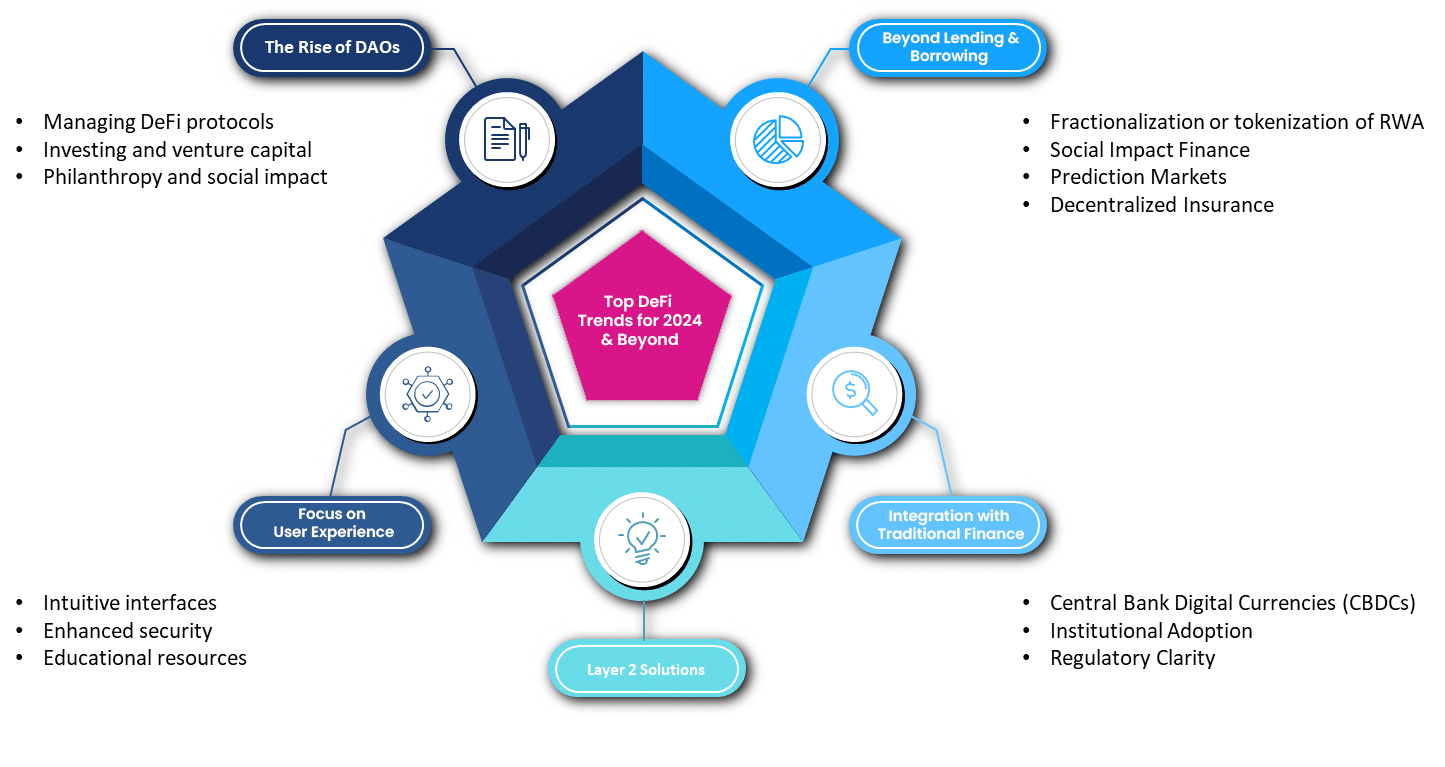The Evolution of Decentralized Finance (DeFi): Innovations Shaping 2024 and Beyond
January 15, 2024
Decentralized Finance, or DeFi, once considered a fringe movement fueled by crypto enthusiasts, is fast morphing into a financial revolution. 2024 promises to be a pivotal year for this dynamic landscape, with groundbreaking innovations poised to blur further the lines between traditional finance and its decentralized challenger. Let’s dive into the key trends shaping the future of DeFi:
Understanding the Rise of DeFi
Traditionally, finance has been centralized, governed by institutions like banks, intermediaries, and regulatory bodies. DeFi challenges this norm by leveraging blockchain technology to create an open, transparent, and decentralized financial ecosystem. It offers a spectrum of financial services—lending, borrowing, trading, and more—without the need for intermediaries. At its core, DeFi aims to provide open and permissionless access to financial tools, enabling anyone with an internet connection to participate in a borderless financial ecosystem.
Importance of DeFi Infrastructure to Unlock Financial Inclusion
The traditional financial system, marked by exclusivity, inefficiencies, and formidable barriers to entry, is undergoing a transformative shift with the rise of Decentralized Finance (DeFi). DeFi represents a paradigm shift towards financial inclusivity, empowering individuals worldwide to participate in lending, borrowing, trading, and more, without dependence on conventional banking institutions.
To fully grasp the significance of DeFi, it is crucial to recognize the pressing challenges inherent in the existing financial landscape.
| Aspect | DeFi | Traditional Finance |
|---|---|---|
| Global Accessibility | DeFi is globally accessible without geographical restrictions. | The services may have limited accessibility based on location and local regulations. |
| Inclusion of the Unbanked | Provides an opportunity for the unbanked population to access financial services. | This may exclude those without a banking history or access to traditional banking services. |
| Interoperability | DeFi platforms can be interoperable, allowing different protocols to work together. | The systems may lack interoperability, leading to isolated financial services. |
| Smart Contracts | DeFi relies on smart contracts for automated and programmable financial agreements. | It typically involves manual contract execution and intermediaries. |
| Permissionless Innovation | DeFi allows for permissionless innovation, enabling developers to create new protocols and applications without seeking approval. | It often requires regulatory compliance and approval for new financial products or services. |
| Collateral and Lending | DeFi enables users to leverage their crypto assets as collateral for loans without traditional credit checks. | Traditional lending often involves complex credit checks and collateral from conventional assets. |
| Counterparty Risks | DeFi aims to minimize counterparty risks through decentralized protocols. | It involves counterparty risks, especially in complex financial transactions. |
| Costs and Fees | DeFi transactions may have lower fees due to reduced intermediary involvement. | The transactions can involve multiple intermediaries, leading to higher transaction costs. |
| Regulatory Oversight | DeFi operates in a relatively decentralized and often less regulated environment. | It is subject to extensive regulatory oversight, varying by jurisdiction. |
The Emergence of DeFi in Traditional Finance
The emergence of DeFi in traditional finance is not a mere trend but a transformative movement. It is poised to reshape the financial landscape, offering greater financial inclusion, efficiency, and accessibility. As both ecosystems continue to converge, we anticipate a future where the boundaries between traditional finance and DeFi blur, giving rise to a more resilient and inclusive global financial system.
Top DeFi Trends for 2024, and Beyond
The year 2024 is set to be a landmark period for DeFi as crypto winter thaws and several trends have reached their natural maturation points. As per Innova experts here’s what 2024 holds for decentralized finance.
1. Beyond Lending and Borrowing: While DeFi initially gained traction for its Peer-to-peer (P2P) lending and borrowing platforms, 2024 will see a diversification of applications. We expect to see innovations in:
- Fractionalization or tokenization of RWA: Democratizing access to high-value assets like real estate and artwork through tokenized ownership.
- Prediction Markets: Harnessing collective wisdom to predict real-world events and create new investment opportunities.
- Decentralized Insurance: Offering flexible and affordable coverage options built on smart contracts.
- Social Impact Finance: Enabling transparent and efficient fundraising for social causes like renewable energy projects.
2. Integration with Traditional Finance: The walls between DeFi and traditional finance are crumbling. 2024 will witness further integration through:
- Central Bank Digital Currencies (CBDCs): Integration of CBDCs with DeFi protocols can streamline cross-border payments and unlock new financial products.
- Institutional Adoption: Traditional financial institutions are exploring DeFi products and services, offering their clients access to this burgeoning ecosystem.
- Regulatory Clarity: As regulators gain a better understanding of DeFi, clearer guidelines can foster responsible innovation and attract larger players.
3. Layer 2 Solutions: Scalability remains a hurdle for DeFi. In 2024, we expect increased adoption of Layer 2 solutions like scaling chains, sidechains, and optimistic rollups to improve transaction speed and reduce fees.
4. Focus on User Experience: Complex interfaces and security risks have hindered DeFi adoption. 2024 will see a focus on improving user experience through:
- Intuitive interfaces: Simplifying DeFi protocols and integrating them with familiar financial tools.
- Enhanced security: Robust security measures and improved risk management tools will build trust and attract new users.
- Educational resources: Comprehensive educational initiatives will empower users to navigate the DeFi landscape safely and confidently.
5. The Rise of DAOs: Decentralized Autonomous Organizations (DAOs) are emerging as powerful tools for community-driven governance and fundraising. In 2024, expect DAOs to play a bigger role in:
- Managing DeFi protocols: DAOs can ensure fair and transparent governance of DeFi projects.
- Investing and venture capital: DAOs can pool funds and invest in promising DeFi startups.
- Philanthropy and social impact: DAOs can facilitate community-driven initiatives for social good.
Innova’s Contribution to DeFi
The journey of DeFi is a story of resilience, adaptability, and a relentless pursuit of a decentralized financial future. Innova Solutions is at the forefront of providing distributed finance technologies that have the potential to revolutionize banking operations. Our offerings align seamlessly with the key trends and challenges faced by the decentralized financial ecosystem.
Digital Assets
Innova’s blockchain-based solutions enhance transparency by converting traditional assets into digital tokens. This streamlines settlements and significantly reduces asset management costs, contributing to the efficiency of the DeFi space.
Digital Currency
Innova’s digital currency solutions offer instant settlement capabilities and 24/7 accessibility. These features not only contribute to efficient payments and settlements but also play a role in lowering costs for consumers, aligning with the cost-effectiveness trend in DeFi.
Cross-Border Payments
DeFi’s global accessibility is one of its defining features. Innova’s cross-border payment solutions provide ease of use, speed, cost-effectiveness, and enhanced security. This helps mitigate high fees, time delays, and security risks in transactions.
Loyalty and Rewards using Blockchain
Innova’s blockchain-based loyalty and rewards solutions offer superior performance by guaranteeing security, transparency, efficiency, and personalized services. This aligns with the broader trend in DeFi where improving user experience is paramount for widespread adoption.
The evolution of DeFi is a testament to relentless innovation and the quest for a more inclusive and efficient financial system. As we progress into 2024 and beyond, the integration of innovative solutions will play a crucial role in shaping the landscape of decentralized finance. The amalgamation of cutting-edge technologies, regulatory clarity, and community-driven initiatives will shape a DeFi landscape that transcends boundaries, unlocking opportunities for financial empowerment and global connectivity.
Happy New Year Everyone!
Key Contributor: Divya Gupta, Lead – Content/ Research & Sales Enablement




